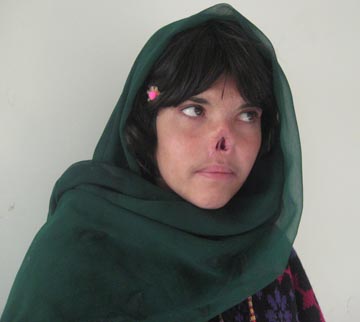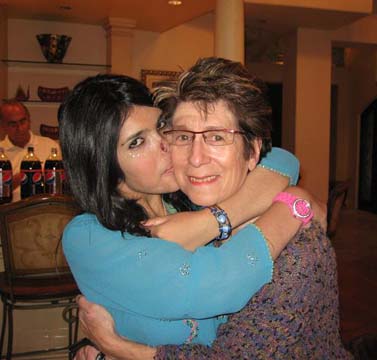Talking to the Taliban: Violence against women not on the cards
The issue, when it hit the stands earlier this year, sparked a massive international storm. Antiwar activists slammed Time magazine editors for the breath-constricting cover photo featuring a young Afghan woman with a mutilated nose. Others rallied to the cause, donating funds and expertise that enabled Bibi Aisha to travel to the US for medical treatment.

The media attention was so intense it sparked yet another media debate about well, the media.
And yet, barely four months later, as the Bibi Aisha story failed to produce the perfect, made-for-TV happy ending, the non-profit organization caring for her is scrambling to raise a measly $25,000 a year to house and look after Aisha in New York.
“We’re trying to fundraise because we want to set up a trust fund so that in the future, when she’s more independent, she’ll have a nest-egg,” says Esther Hyneman, board member of the New York and Kabul-based Women for Afghan Women (WAW). “The minimum expenses for her care in the first year amounts to $25,000.”
While Aisha did make it to California, where she was fitted with a prosthetic nose under the care of the California-based Grossman Burn Foundation, the young woman applies the prosthetic herself, with a glue Q-tip.

She still needs extensive reconstruction surgery, for which doctors say the still traumatized girl from a southern Afghan village is not quite ready.
“The surgeons tell us that she’s not yet mentally ready for the reconstructive surgery, which will be painful and long-drawn-out,” says Sunita Viswanath, co-founder of WAW. “It will take time for Aisha to be ready--which is understandable considering the trauma she has suffered. She has emotional outbursts when she appears to go back to her traumatic past. She’s had access to mental health professionals in LA, and continues to in NY. We are confident that she will soon be strong enough. But right now, she's just not ready."
Talking about talking to the Taliban
As the world marks International Day for the Elimination of Violence Against Women Thursday, the media spotlight will once again turn to the appalling levels of violence against Afghan women.
In 2001, when the US and its allies invaded Afghanistan, women’s rights were high on the agenda, next only to eliminating al Qaeda and the Taliban.
But almost a decade later, violence against women in Afghanistan is rife. A 2008 nationwide survey of 4,700 Afghan women found 87.2 percent had experienced at least one form of physical, sexual or psychological violence, or a forced marriage.
In a speech delivered in Kabul on the eve of International Day for the Elimination of Violence Against Women, Afghan President Hamid Karzai said the Taliban's opposition to women’s education was against Islam. Calling on the Taliban to stop attacking girls’ schools, Karzai warned that a failure to educate women stymies the development of a generation.
Karzai has been the leading proponent of the “talking to the Taliban” strategy that has turned into the new mantra in some Afghan and US policy circles.
As many Afghan and international experts note, the Taliban is a Pashtun movement and if certain conditions are met, the movement – or at least some willing parts of it - should be included in the political process.
But since the peace and reconciliation wagon was officially put on the tracks at the January London Afghanistan Conference, the talking to the Taliban strategy has followed a familiar “talks about talks” pattern.
Over the past few months, we’ve had an endless series of news reports quoting various senior Afghan and/or Western diplomats – unnamed for the most – revealing secret negotiations with senior Taliban leaders.
These are followed by Taliban denials of any talks. New straws are grasped at with ardor, such as Iran’s likely involvement in the peace process, US military involvement or Pakistani involvement. They’re all taken as signs that the double track surge-cum-negotiation strategy is/could/ just might work.
But then news reports such as the bizarre case of US and Afghan officials negotiating with an impostor posing as a senior Taliban leader, do not inspire much faith.
While many Afghans support a negotiation, several Afghan women and women’s rights groups are wary of what that might entail.
“Talking to the Taliban, trying to reconcile with the Taliban, will only lead to a hastening of the worst outcome for women,” says Viswanath. “People’s first order of business if the Taliban is back will be to lock their women in their houses. Even if we have promises to uphold the Afghan Constitution and human rights, we just don’t believe them. Look what happened in [Pakistan’s] Swat Valley last year – within three weeks of a Taliban takeover there were beheadings, floggings, girls schools burned.”
Not 'a medieval country impervious to progress'
Despite Karzai’s latest seemingly feminist rhetoric, the Afghan president’s track record on women’s rights has been middling. It was Karzai, after all, who backed and signed the controversial Shia Personal Status law last year, triggering a massive outcry from Afghan and international human rights groups.
A massive campaign by Afghan and international rights groups forced Karzai to revise the law, but the changes were cosmetic. Under the law, a Shiite woman still needs her husband’s permission to leave home except for a rather vaguely termed “reasonable legal reasons”. Meanwhile husbands can cease maintaining their wives if they do not meet their marital – including sexual – duties.
But while the international community has grown weary of the bleak news emanating from Afghanistan, Hyneman is at pains to note that considerable progress has been made in Afghan women’s rights over the past nine years.
“We want to stress that the idea that Afghanistan is a medieval country that is impervious to progress is simply false,” says Hyneman. “But our biggest fear is that if the country falls to the Taliban, it will mean we will not be able to pursue our work.”
For women like Bibi Aisha, that would spell a disaster. It was at the WAW women’s shelter in Kabul that Aisha finally got a break from the systemic violence she was subjected to at her in-laws after she was bartered into a marriage to settle a community dispute.
That’s a sobering thought as we mark International Day for the Elimination of Violence Against Women.
(For more information or to donate to the Bibi Aisha fund, go to:




11 Comments
Post new comment